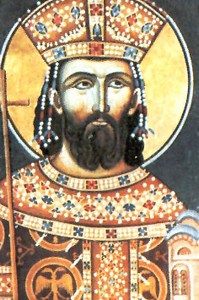Stavilac
Stavilac (Serbian Cyrillic: ставилац, literally meaning "placer") was a court title in Medieval Bosnia and Medieval Serbia in the Middle Ages.[1][2] It was similar to the Byzantine court offices of domestikos and cup-bearer (pinkernes, known in Serbian as peharnik).[2] It had a role in the ceremony at the royal table, though the holder could be entrusted with jobs that had nothing to do with court rituals.[3] According to studies of Rade Mihaljčić, the holder was in charge of acquiring, preparing and serving food at the royal table.[4] It was a confidant duty, given to the highest and most notable nobility, which the ruler relied on in all occasions.[4]
History of usage
Its oldest mention is from the Serbian court of King Stefan Milutin (r. 1282–1321), when Đuraš Vrančić had the title.[4] The title of stavilac ranked as the last in the hierarchy of the Serbian court, behind čelnik, kaznac, tepčija and vojvoda, the supreme title.[5] It was, nevertheless, quite prestigious as it enabled its holder to be very close to the ruler.[3] In the Dečani chrysobulls, King Stefan Dečanski (r. 1321–1331) mentioned that the court dignitaries present at the Dečani assembly were the kaznac, tepčija, vojvoda, sluga and stavilac.[6] There is not much information on the title-holders at the court of King Stefan Dečanski; there is however much information on those at the court of King and Emperor Stefan Dušan (r. 1331–1355).[7]
In Bosnia, this court title appears for the first time with a coronation of the first Bosnian king, Tvrtko I Kotromanić. As soon as he ascended to a Bosnian throne as a king in 1377, Tvrtko reorganized his court reflecting some of the Serbian court-office titles, ceremonials and traditions.[1]
List of Bosnian stavilac
- Tvrtko Vlađević (1378), served King Tvrtko I
- Ivan Radivojević (1392) served King Dabiša
List of Serbian stavilac

- Đuraš Vrančić (?), served King Stefan Milutin.[4]
- Miloš Vojinović (fl. 1333), served King Stefan Dušan. Son of Vojvoda Vojin.[7]
- Gradislav Sušenica, served King Stefan Dušan. (disputed[8])
- Vojislav Vojinović (c. 1350–55), served Emperor Stefan Dušan. Son of Vojvoda Vojin.
- Lazar Hrebeljanović (fl. 1355–1362), served Emperor Stefan Dušan and Emperor Uroš V.
See also
- Serbian noble titles
- Stolnik, title in Poland and Muscovy
References
- ^ a b Pejo Ćošković (2009). "Tvrtko I - Kotromanići". hbl.lzmk.hr (in Croatian). Hrvatski biografski leksikon. Retrieved 1 April 2021.
Reorganizirao je dvor preuzevši neka zvanja, službe i ceremonijal srpskoga (dijaka je zamijenio logotet, kaznaca protovestijar, naslovu stavilac odgovarala bi bizantska dvorska titula domestika i domestika stolnika).
- ^ a b Andrija Veselinović; Radoš Ljušić (2008). Srpske dinastije. Službene glasink. p. 240. ISBN 978-86-7549-921-3.
- ^ a b Mihaljčić 2001, pp. 15–28.
- ^ a b c d Blagojević 2001, p. 34.
- ^ Blagojević 2001, p. 211.
- ^ Srđan Šarkić (1996). Srednjovekovno srpsko pravo. Matica srpska. p. 66. ISBN 9788636303696.
- ^ a b Blagojević 2001, p. 35.
- ^ Božidar Zarković; Dušan Radunović; Vesna Sekulić; Vukosava Stevović (2002). Hotačka metohija: prvi hilandaroski posed u Srbiji. Institut za srpsku kulturu. p. 144. ISBN 9788682797265.
Sources
- Blagojević, Miloš (2001). Državna uprava u srpskim srednjovekovnim zemljama (in Serbian). Službeni list SRJ. ISBN 9788635504971.
- Ćirković, Sima; Mihaljčić, Rade (1999). Лексикон српског средњег века (in Serbian). Knowledge. ISBN 9788683233014.
- Dinić, Mihailo; Ćirković, Sima (1978). Српске земље у средњем веку: историјско-географске студије (in Serbian). Српска књижевна задруга.
- Mandić, Svetislav (1986). Velika gospoda sve srpske zemlje i drugi prosopografski prilozi (in Serbian). Srpska književna zadruga. ISBN 9788637900122.
- Mihaljčić, Rade (2001) [1984]. Лазар Хребељановић: историја, култ, предање (in Serbian). Belgrade: Srpska školska knjiga; Knowledge. ISBN 86-83565-01-7.
- Mihaljčić, Rade (1976). "Ставилац" [Stavilac]. Istorijski časopis. ХХIII: 5–21.
- Purković, Miodrag (1985). Srpska kultura srednjega veka (in Serbian). Izd. Srpske pravoslavne eparhije za zapadnu Evropu.
- Šarkić, Srđan (1996). Srednjovekovno srpsko pravo (in Serbian). Matica srpska. ISBN 9788636303696.
- Srejović, Dragoslav; Gavrilović, Slavko; Ćirković, Sima M. (1982). Istorija srpskog naroda: knj. Od najstarijih vremena do Maričke bitke (1371) (in Serbian). Srpska književna zadruga.
